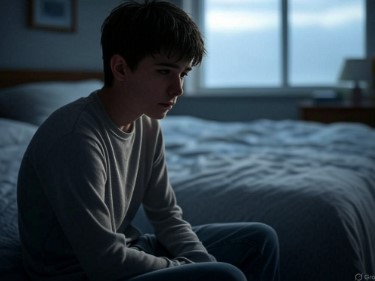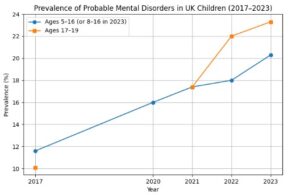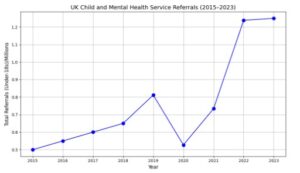
Helping Your Child In a Mental Health Crisis
Posted on May 15, 2025Helping Your Child In a Mental Health Crisis
As I write this blog, it is mental health awareness week, which aims to bring awareness to the issues around mental illness. For some time, I have personally worried about the current explosion in mental health problems in children and unqualified families dealing with a mental health crisis. At first this was from the experiences of my son and his friends but also from hearing about it from family members that work in this field. I do not think that I am alone in seeing this, and maybe you have noticed personally that things seem worse. Unfortunately, even some professionals I have discussed it with also agree that it is reaching near epidemic proportions. There appears to be a mental health crisis happening.From one of our parents
‘In our area (Havering) CAMHS routinely quote long waiting lists for assessments and therapy. Sometimes over a year but without conviction of certainty of that date. Our fear is the queue is getting longer and there isn't a resource to bring it down. Separately this year therapy funding for adopted children had dropped from 5 to 3 thousand pounds for the year and there is no funding for specialist assessments’What can we do?
I would like to discuss these issues with you and, at a time with increasing waiting times for therapy, I aim to offer some advice while you wait. This blog aims to remind you that there is always help, and that there is always hope. We will also delve into some possible causes behind the increase and discuss the many different things you can do yourself to try to help your children.Background
Just how bad is the increase in child mental health problems, when did it start, and what’s causing it? There are some statistics available that can give us some insight into the scale of the issue.The size of the problem
According to the NHS In 2023, 20.3% of children aged 8–16 in England had a probable mental disorder, up from 12.1% in 2017.-- Anxiety disorder prevalence in 5–15-year-olds rose from 4.7% in 2017 to 8.3% in 2022, stabilizing at 8.5% in 2023.
-- Depression rates in the same age group increased from 1.9% in 2017 to 3.8% in 2022, reaching 4.1% in 2023.
-- Post-COVID, anxiety rates peaked in 2020 at 9.2% for 5–16-year-olds, with a slight decline but no return to pre-pandemic levels.
The graph below shows the increase in child mental health problems since 2017. Notice that COVID had an impact, but that rates have been increasing gradually for some time.

Seeking help
Between 2020/21 and 2022/23, mental health referrals for children and young people in England increased by over 50%, rising from 821,734 to 1,288,653.In 2025, approximately 4,000 children in England are referred to NHS mental health services for anxiety each week, with 500 facing emergency Child and Adolescent Mental Health Services (CAMHS) referrals.
As of March 2024, over 305,000 children and young people were waiting for mental health support, and 2025 reports indicate ongoing delays, with some children waiting over four weeks for initial assessments
The graph below shows the large increases in referrals for child mental health issues.

What could be the reasons behind the size of the increase?
It's undeniable that COVID brought the world a lot of challenges. It definitely had an impact on the mental health crisis. However, if you look at the graphs, the amount of cases and referrals have been steadily rising since as far back as 2017.
It may not just be one reason but a mixture of multiple issues. There are large economic problems that affect both parents and their children. Poverty in itself can be a major stressor.
Children feel under much ever more academic pressure while simultaneously worrying if they will be able to get a job or ever own their own house. Add to this twenty-four hour news worrying viewers with stories about the climate emergency or ongoing wars and there can be no escape for children. Having a smartphone can keep them connected to the world but also brings constant comparisons on social media with other people lives, or worse yet bullying and predators.
Children’s physical health issues and the recent delays in getting treatment on the NHS can also cause accompanying poor mental health.
Family breakdown can leave children isolated and feeling unsupported, although there are often very good reasons to separate it has greatly increased. Among children born in 2002, 43% experienced parental separation by the age of 16, compared to 21% for those born in 1970 and 9% for those born in 1958.
Finally, some people believe that greater awareness and lower stigma lead more people to recognise their mental health problem and to seek help.
All of these problems were made worse by COVID, but ,unfortunately, much of it was happening anyway.
Taking matters into your own hands if your in a mental health crisis.
The average waiting time for children and young people accessing mental health support after referral for professional help, known as CAMHS, is 35 days for those who receive support.As this wait can vary by region, mental health condition and how busy the service is, you could possibly be waiting much longer.
These delays mean some parents are having to take matters into their own hands. This is a real experience ’CAHMS is ineffective and doesn’t have the resources to adequately help. Faced with limited support we decided to see what we could do ourselves. We have no expertise but we at least understand our child (somewhat).’
While there is no proper substitute for qualified and professional help, there are things you can try for yourself to help your child in the meantime. Unfortunately there are usually no quick fixes, and it is often the case you will have to experiment with your approach depending on the condition your child has, its severity and your child's personality.
It is very important to keep professionals informed especially of changes for the worse. Keep in the system and don’t drop out. Keep banging the drum about support.
What to watch out for in your children
There are many symptoms that your child may have if they are suffering from a mental health condition. Some of them overlap between conditions and some are specific.Sometimes your child may just be having a bad day or going through the normal challenges of life.
If you have concerns you should seek the advice of a mental health professional. If behaviour continues, is out of character for your child or has no real understandable reason please seek advice from a professional.
Here are some of the symptoms in many mental health conditions, but be aware that there are many others possible.
Sadness or Crying
Irritability or Anger
Anxiety and Worry
Low self-esteem
Withdrawal
Changes in sleep or diet/weight loss
Hyperactivity
Poor concentration or academic performance
Obsessions
Forgetfulness/ Difficult making decisions
Headaches Lethargy
Bullying
Risk Taking or poor behaviour.
Self Harm
Panic Attacks
Disconnection from Self or Reality.
Before you do anything consider your intervention and consequences of actions:
Please be mindful before you consider stepping in that there may be consequences, for example your child may have a reservoir of toxic emotions locked in the brain. By discussing them you may open the flood gates and be unprepared and unqualified to deal with the flood. Each parent must make their own decisions as to what's best for their child. The parent who provided input to this blog had tried some of the actions below. Their intervention was effective and made the child feel they aren’t alone. Which the family felt was a positive. The family became concerned at the lack of support they were receiving and the damage their child's mental health crisis was having. So they took the matter into their own hands judging they were in a situation where their involvement although unqualified was better than the planned delays from local service.Here are some things to try:
Try to discuss with your child how they feel, without getting frustrated or angry. Stay calm and let them lead. Respect your child's privacy where necessary.Communicate at your child's level. If your child feels more comfortable texting then go with this. You don’t need to sit around the kitchen table to communicate.
Go at your child's pace. Be patient, don’t force the issue. You want to be open and available to your child. Conversations may happen at off times but don’t shut them down. Be available.
Make them feel that it's OK to feel the way they do. How they feel is the significant part, not what you think of the issue.Don’t dismiss or try to ‘solve’ their feelings. Other people may not feel or be impacted in the same way, it's your child's feeling that count.
Check in regularly with your child. Don’t be overbearing but be there for them.
Talk to a Doctor to see if any type of medication could help, but make the decision to use it as a family with input from local mental health services. Understand the issues and risks. Understand how the child comes off the medication.
Try to find out if there is a background issue, such as bullying but don’t assume there is a reason behind everything. Mental health can be complicated.
Encourage your child to not rush feeling better and praise them for any effort, not the outcome. Let them know they will improve in time.
Reassure them that help is on its way and that you are there for them. They are not alone, and you will do whatever you can to help. Do this as often as you need to.
Realise that you are not an expert, but you can still offer help.
Don’t offer quick fixes, and recognise the problem feels much larger to your child.
Good habits in sleeping, eating, and socialisation can help stop them feeling worse or spiraling down where appropriate.
Encourage them to do any comforting and distracting hobbies that they used to enjoy such as drawing, art, music, or sport.
Create a safe space with comforting objects such as a bedroom that is relaxing and an area where your child can retreat.
Gently discourage bad habits and obsessions like video games, caffeine/sugary foods or excessive screen time. Trying compassionately replacing them with healthier alternatives. However a limited amount of screen time or gaming may actually help them relax and stay socially connected. Consider, however, keeping an eye on their online activity to ensure that it's not harmful.
Teach your child about relaxation techniques such as breathing techniques, mindfulness, grounding techniques or journaling. Join in where you can or do them as a family together. These skills will be useful for the rest of their lives but they are probably not a solution to everything.
Limited light exercise, alone or in a group, is proven to improve mental health. Encourage them to go out, offer rewards, walking to their favourite fast food restaurant for instance.
Reduce stressors in your child's life by removing them where necessary or assisting them. Liaise with the school and advocate for a reduced timetable if helpful.
Encourage your child to still see friends and to socialise, even if on a smaller, limited scale.
Conclusions
Seeing your child suffering is always difficult for a parent. When you don’t know how to help them and the wait for professional help is extended, then it is even more frustrating. A mental health crisis can be frustrating and difficult to understand and deal with.Hopefully some tips in this blog have been valuable to you.
Another aspect to consider is that you focus on looking after yourself in the process as a parent. It is often said that you cannot pour from an empty cup. To look after your child, you need to set boundaries to be mentally and physically well yourself. This also means keeping an eye on any siblings or other family members during this difficult time. It is also vitally important that if you notice a deterioration in your child's symptoms and that you inform the professionals so they are prioritised further. If the deterioration makes you worry about their immediate safety, do not hesitate to contact your GP or A + E.
Be prepared for a rollercoaster of good and bad days on the journey but instead look for gradual improvements. Do not rush it. Don’t focus too much on labels in mental health but educate yourself about their diagnosis. Read websites online and find a recommended book or talk to charity organisations about the condition. That way, you can be better prepared to help and understand.
Don't hesitate to consider the help of supporting charities, school resources, helplines or using private help if appropriate. Frequently chase appointments and the people providing support services. You have a right to help.
We wish you the very best in your journey to good mental health. You are not alone in struggling with this. Other families are also frustrated and unsure what to do.
We hope this blog, Helping Your Child In a Mental Health Crisis, has helped you and given you a balance as what you can do, should you need to.
There is always help and in time your child can start to feel better.
Drew is a parent based in the UK and is a champion of children's issues and helping parents navigate the everyday challenges of being a parent.

Being a parent can be hard and scary
We know we’re parents to. It’s OK not to have all the answers and not understand everything.We formed the Parents Support Club and CosyChats.com To support and help parents by sharing our experience and knowledge. To be a support group to show you are not alone. Your concerns and anxiety are shared by other parents but together we can help each other through.
Join our parenting club.
Parents Support Club • Facebook
Parents Support Club • YouTube
Parents Support Club • TikTok
1 2 1 Parenting Support is available at CosyChats
For More Great Blogs From Experienced Parents, Click Here.
More help Mind